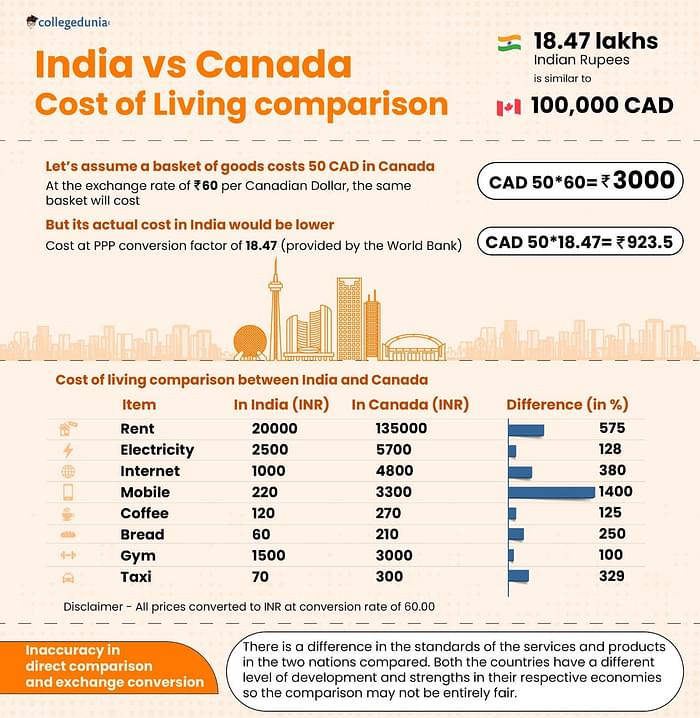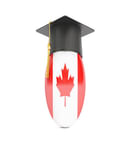Short courses for international students in Canada have become extremely popular globally in the last two decades. Due to its affordability and diverse range of career options, Canada now holds the 3rd position as a receiver of international students after the USA and UK. Though Canada is one of the most expensive study abroad destinations, the short courses are famous for not breaking the bank. The tuition fee for short courses in Canada ranges between 20,000 to 45,000 CAD i.e around 15 to 30 lakhs for Indian students.
Explore! Cost of Studying in Canada
Short term courses in Canada are quite popular among international students due to their career-concerned curriculum, short duration, and affordable course fee. To secure admission in Short term courses in Canada an international student requires a minimum GPA of 2.67 on a scale of 4.0. Additionally, international students are required to submit an IELTS score of 7 to prove proficiency in English.
Also Check: Admissions in Canadian Universities
Why study short term courses in Canada?
According to a report published by the Canadian Bureau of International Education, almost half a million international students are enrolled in various universities in Canada. Short term courses are gaining huge popularity among international students. Here are a few reasons why you should consider pursuing a short course for international students in Canada.
- Short term courses in Canada are perfect for students who don't plan to stay in Canada for a long time.
- The short courses are focused on career options. The job-oriented structure of the short courses will offer you a great amount of practical learning experience.
- Certificate or diploma courses can be a gateway to the diverse range of job opportunities available worldwide.
- Compared to regular degree programs, short courses are way more cost-efficient in Canada.
- The unemployment rate of Canada as of 2022 is 5.29%, which represents abundant job opportunities for graduates.
Types of Short Term Courses in Canada
Short term courses in Canada are generally divided into two sections.
- Diploma programs
- Certificate programs
Diploma and certificate courses are offered at both undergraduate and postgraduate levels.
Undergraduate diplomas or certificates
Students can apply for the undergraduate diploma/certificate courses after finishing their secondary education. An undergraduate diploma usually takes one or three years to complete depending on the college and course.
General Admission Requirements for UG diploma/certificate-
- Transcription of previous education containing the documentation of the last four years of high school
- IELTS score of at least 7 or TOEFL iBT score of at least 80
- Proof of financial stability
Postgraduate diploma or certificate -
Students who have finished their graduation or undergraduate diploma from a recognized university can apply for the postgraduate diploma or certificate courses. In this case, the completion of certificate programs takes around six months to one year. The duration is kind of the same for the postgraduate diploma programs.
General Admission Requirements for PG diploma/certificate-
Here’s a list of things needed to get admission to the PG diploma/certificate courses in Canada.
- An undergraduate degree with at least 65% aggregate
- IELTS score of at least 7 or TOEFL iBT score of at least 80
- Transcription of previous education
- SOP for PG diploma courses in Canada
- Proof of financial stability
Differences b/w Regular Courses and Short Term Courses in Canada
There are a few basic differences between a regular degree program and a short course for international srudents in Canada. It's easy to get confused while picking a course. Degree courses and short diploma/certificate courses come with their own set of pros and cons. Let's discuss a few of the advantages and disadvantages through a comparative analysis.
Cost:
Degree courses in Canada are generally expensive compared to short courses. The short term courses in Canada have a very reasonable course fee. While degree courses can cost up to 10-15 lakhs INR per year, short courses in Canada cost around 7-12 lakhs INR per year.
Duration:
The key difference between degree programs and short diploma/certificate courses is the duration. Short courses usually take 1-2 years to finish except for some Engineering courses that can last up to three years. Degree courses take at least three to four years to complete.
Curriculum:
Degree courses are more comprehensive and cover a wide range of topics related to a specific field of study, whereas short term courses are focused on a specific subject or skill.
Work/study permit:
A study permit is granted for every kind of course in Canada but for post-graduation work permits, the eligible students must have enrolled in any course that has a duration of more than six months.
Career Prospects:
A degree program provides more in-depth knowledge and skills, which can lead to better career prospects and higher earning potential, whereas short term courses provide specialized knowledge that can enhance existing skills and improve job prospects.
International value:
Degree courses in Canada have worldwide recognition while the short courses aren’t valued much in the international job market.
Short diploma/certificate courses:
One can choose among a diverse range of streams when it comes to short courses for international students in Canada. Most of the streams are available in both certificate and diploma courses. Here's a list of the most popular short certificate/diploma courses available in the educational institutions of Canada.
| Diploma/Certificate Course | Average Annual Fee (CAD) | Approximate cost per year (INR) |
|---|---|---|
| Engineering | ||
| Automotive Engineering | 30,000 | 18.60 lakhs |
| Chemical Engineering | 12,046 | 7.47 lakhs |
| Civil Engineering | 16,394 | 10.16 lakhs |
| Electrical Engineering | 16,704 | 10.35 lakhs |
| Computer Engineering | 15,802 | 9.8 lakhs |
| Mechanical Engineering | 16,394 | 10.16 lakhs |
| Manufacturing | 20,577 | 12.76 lakhs |
| Architecture Studies | ||
| Architecture | 15,951 | 9.89 lakhs |
| Interior Designing | 20,000 | 12.40 lakhs |
| Business Studies | ||
| Business Administration | 36,000 | 22.25 lakhs |
| Business Management | 20,250 | 12.51 lakhs |
| Accountancy | 18,350 | 11.34 lakhs |
Colleges that offer short term courses in Canada
Nowadays, almost every reputed universities in Canada is offering short diploma/certificate courses. Here's a list of a few popular colleges that offer short diploma/certificate courses in the above-mentioned domains.
| College | Average Tuition Fee (CAD) | Average Tuition Fee (in INR) |
|---|---|---|
| Northern Alberta Institute of Technology (NAIT) | 27,750 | 17.15 lakhs |
| British Columbia Institute of Technology (BCIT) | 9,315 | 5.75 lakhs |
| Conestoga College | 13,750 | 8.49 lakhs |
| Southern Alberta Institute of Technology (SAIT) | 29,094 | 17.98 lakhs |
| Algonquin College | 19,000 | 11.74 lakhs |
Short term courses in Canada: Admission Process
The admission requirements vary from one institution to another as the education system in Canada falls under the command of the provincial jurisdiction.
Admission requirements for short courses for international students in Canada:
- Academic transcripts: The majority of the institutions in Canada ask for a transcript of the last four years in high school or equivalent courses for the undergraduate certificate/diploma courses. For the post-graduation diploma/certificate courses, the graduation certificate is mandated.
- Birth certificate: Most of the colleges in Canada require the candidate to submit a birth certificate and if the candidate happens to be under the age of 18 then a set of documents regarding parental consent will be required.
- Language proficiency certificate: Students who belong to non-English speaking countries will have to submit proof of proficiency in English through standardized tests. Below is a list of exams that can be used as proof of proficiency in English while applying for the short term courses in Canada.
Immigration Documents:
An international study permit is required to get admission to the short term courses in Canada. Here’s a list of a few things you’ll need to apply for the study permit.
- Updated passport
- A temporary resident/travel visa
- Acceptance letter from the designated learning institute
Also Check: Canada Student Visa Application Process
Cost of Studying Short Term Courses in Canada
The cost factor can be divided into two sections. The academic cost and the other travel and accommodation expenses. The academic cost for short term courses in Canada is cheaper than the full-time graduation or post-graduation courses. Here’s a list of approximate academic costs of different universities.
| Province | Average Annual Tuition Fee (CAD) | Average Annual Tuition Fee (INR) |
|---|---|---|
| Ontario Colleges | 17,650 | 10.91 lakhs |
| Quebec Colleges | 19,860 | 12.28 lakhs |
| Alberta Colleges | 22,890 | 14.15 lakhs |
Cost of Living in Canada
The estimated expenditure and cost of living in Canada for an international student is around 1,987 CAD (1.19 lakhs INR)
| Expense Type | Average Cost (CAD) | Cost Equivalent (INR) |
|---|---|---|
| Accommodation | 1,037 | 62,465 |
| Food | 290 | 17,471 |
| Transport | 107 | 6,446 |
| Internet | 80 | 4,819 |
| Books and Supplies | 163 | 9,818 |
| Miscellaneous | 310 | 18,673 |

Job Opportunities after Short Term Courses in Canada
Canada is famous for its diverse range of jobs and career-friendly environment
- Short certificate/diploma courses are job-oriented. These courses provide the majority of the practical training a student needs to land a job.
- The institutions mostly offer placement services along with short courses.
- To join a company in Canada, students need to apply for a working visa permit.
Explore: Post-Study Work Visa in Canada
Here's a list of things you need to apply for a job interview in Canada after the completion of your certificate/diploma course.
- A study permit valid up to 180 to 360 days after the completion of your course
- Official college-approved certificate of completion
- Biometric documents like fingerprints and passport-sized photos.
- An updated passport that is valid up to the limit of the post-graduation work permit.
Here’s a list of Job roles and average salaries one can get after completing short courses in Canada.

| Job role | Average Annual Salary (CAD) | Average Annual salary (INR) |
|---|---|---|
| Accountant | 54,000 | 33.37 lakhs |
| Auditor | 58,000 | 35.84 lakhs |
| Architect | 68,000 | 42.02 lakhs |
| Interior Designer | 58,000 | 35.84 lakhs |
| Engineer | 67,000 | 41.41 lakhs |
| Full Stack Developer | 72,000 | 44.50 lakhs |
| Data Analyst | 60,000 | 37.08 lakhs |
| Content writer/Copywriter | 46,000 | 28.43 lakhs |
| Digital Marketing | 68,000 | 42.02 lakhs |
| Chef | 72,000 | 44.50 lakhs |
The government of Canada provides every kind of assistance to international students if they decide to settle down there. If you are looking for upgrading your educational qualification with a career-oriented diploma/certificate course then Canada might be the best fit for you.
Being one of the strongest economies in the world, Canada ensures high living standards infused with a flexible educational environment. Educational institutions in Canada encourage practical learning. Colleges and universities usually keep the classroom small to pay an equal amount of attention to each student.
Besides being an educational hub, Canada is also famous for its highly decorated and diverse job market. A ton of international students and working professionals prefer Canada as their job destination.
FAQs
Ques: What short courses can I do in Canada?
Ans: There are many short courses that you can take in Canada, depending on your interests and career goals. Some popular options include:
- Professional development courses: There are many short courses available in Canada that can help you improve your skills in a particular industry or field. These courses can range from a few days to a few weeks and cover a wide range of topics such as project management, leadership, marketing, and more.
- Technology courses: With the rapidly evolving technology industry, taking a short course in areas such as mechanical engineering, software engineering, civil engineering, etc
- Entrepreneurship courses: If you're interested in starting your own business or working in the startup world, there are many short courses available that can help you develop your entrepreneurial skills, such as Business Administration, Business Management, Accounting, etc
- Creative arts courses: If you're interested in the arts, there are many short courses available in Canada that can help you develop your skills in areas such as music, film, writing, or visual arts.
- Continuing education courses: Many universities and colleges in Canada offer short courses that are designed for students who want to continue their education but don't have the time or resources to pursue a full degree.
Ques: Is there any 6 months course in Canada?
Ans: Yes, there are many 6-month courses available in Canada. These courses are typically shorter in duration than a full-time degree program and can provide a more focused and practical education in a specific area of study. The most common example of this is Diploma and Certificate programs. Many Canadian colleges and universities offer diploma and certificate programs that can be completed in 6 months. These programs are designed to provide students with the skills and knowledge they need to succeed in their chosen career, and they can cover a wide range of topics such as business, healthcare, technology, and more.
Ques: What are the best short courses to study in Canada?
Ans: The best short courses to study in Canada depend on your personal interests and career goals. However, here are some popular short courses that are highly regarded by employers and can help you improve your skills and advance your career:
- Mechanical Engineering
- Project Management
- Data Analysis
- Digital Marketing
- Entrepreneurship
- Cybersecurity
- Artificial Intelligence and Machine Learning
Ques: What are the admission requirements to pursue short term courses in Canada?
Ans: Admission requirements for short courses in Canada:
- Academic transcripts: The majority of the institutions in Canada ask for a transcript of the last four years in high school or equivalent courses for the undergraduate certificate/diploma courses. For the post-graduation diploma/certificate courses, the graduation certificate is mandated.
- Birth certificate: Most of the colleges in Canada require the candidate to submit a birth certificate and if the candidate happens to be under the age of 18 then a set of documents regarding parental consent will be required.
- Language proficiency certificate:: Students who belong to non-English speaking countries will have to submit proof of proficiency in English through standardized tests: IELTS: 7.0 | TOEFL: 80
- Immigration Documents: An international study permit is required to get admission to the short courses in Canada. Here’s a list of a few things you’ll need to apply for the study permit:
- Updated passport
- A temporary resident/travel visa
- Acceptance letter from the designated learning institute
![University of Toronto [U of T]](https://static.zollege.in/public/college_data/images/studyabroad/logos/college_104_25-12:44_University_of_Toronto-logo-2417C8AF32-seeklogo.jpeg?tr=w-50,h-50,c-force?tr=h-40,w-35,c-force)
![The University of British Columbia [Ubc]](https://static.zollege.in/public/college_data/images/studyabroad/logos/college_64_25-11:13_Capture.jpeg?tr=w-50,h-50,c-force?tr=h-40,w-35,c-force)
![McGill University [Mcgill]](https://static.zollege.in/public/college_data/images/studyabroad/logos/college_39_24-17:26_macgill.jpeg?tr=w-50,h-50,c-force?tr=h-40,w-35,c-force)
![University of Montreal [U de M]](https://static.zollege.in/public/college_data/images/studyabroad/logos/college_71_24-17:54_udem.jpeg?tr=w-50,h-50,c-force?tr=h-40,w-35,c-force)
![Simon Fraser University [Sfu]](https://static.zollege.in/public/college_data/images/studyabroad/logos/college_54_25-11:01_Capture.jpeg?tr=w-50,h-50,c-force?tr=h-40,w-35,c-force)
![University of Alberta [UAlberta]](https://static.zollege.in/public/college_data/images/studyabroad/logos/college_9_24-17:46_alberta-.jpeg?tr=w-50,h-50,c-force?tr=h-40,w-35,c-force)












